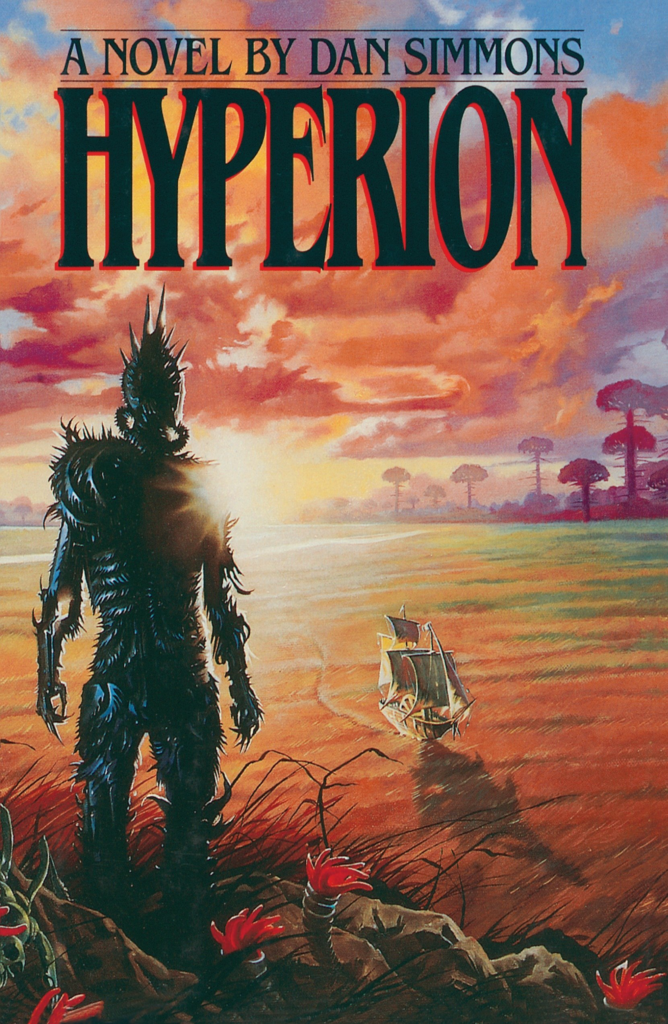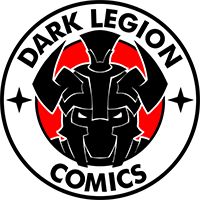Book Discussion: Hyperion by Dan Simmons

Saturn is fallen, am I too to fall?
Am I to leave this haven of my rest,
This cradle of my glory, this soft clime,
This calm luxuriance of blissful light,
These crystalline pavilions, and pure fanes,
Of all my lucent empire? It is left
Deserted, void, nor any haunt of mine.
The blaze, the splendour, and the symmetry,
I cannot see—but darkness, death and darkness.
Even here, into my centre of repose,
The shady visions come to domineer,
Insult, and blind, and stifle up my pomp.—
Fall!—No, by Tellus and her briny robes!
Over the fiery frontier of my realms
I will advance a terrible right arm
Shall scare that infant thunderer, rebel Jove,
And bid old Saturn take his throne again.
Hyperion – unfinished poem by John Keats
I think the dumbest criticism I keep seeing about this book is that the tales are “told in flashback.” Leaving little room for plot advancement.
These are the same kind of barely literate howler monkeys who complain about how the Lord of the Rings is an abject failure because Gandalf should have just called up the eagles while they were all in Hobbiton.
Premise: On the eve of a galactic war that will leave worlds burning and millions dead. Seven strangers meet for the first time on a ship that is headed for a mysterious planet named Hyperion. They are on a pilgrimage to reach a place called the Time Tombs and see a god-beast called the Shrike to beg a favor of him. They must follow the route of the pilgrimage on Hyperion in order to get there, any ships that simply land at the Time Tombs are found empty. At the end of their quest, they will tell the shrike what they want. One of them will receive whatsoever that pilgrim desires. The rest will die in agony. They know this going in.
That immediately arrests the attention of the reader. What would you want so badly that you are willing to take an arduous trek across an alien world just to throw the dice on odds that are 6 out 7 favoring the chance that an alien god-beast will crucify you?
As the book progresses you get to find out. The pilgrims all agree to tell each other their tales on the road, and you get to find out what made all of them so desperate that they had to take the chance.
So yes, Hyperion is based on the Canterbury Tales. But the themes are much more heavily influenced the poem fragment, Hyperion by John Keats. The centuries dead poet is frequently a central character in their tales. Although, the Shrike is a central figure in almost all of them.
The main point of view character is a man known as the Consul. His tale is the last one, he is a diplomat who has built his entire life and career around building the most devastating act of treason imaginable.
The pilgrims are The Priest, The Solider, The Poet, The Scholar, The Detective and The Consul himself. There is also a ship’s Captain who doesn’t get a chance to tell his tale in this book. What makes this book special is Simmons’ ability to grant each of his pilgrims a separate and distinct voice with a style of prose that is unmistakably unique to each character. This gives all of them a feeling of being the product of the life they have lived.
As this book was written in 1989 the author was able to get away with an overtly Christian story in the Priest’s Tale. I suppose it would be allowed today if the Paul Duré had ended up as an atheist or better still a homosexual child rapist but no, he was none of those things. By the end of the tale he was a Christian martyr whose faith had been immensely strengthened after being severely tested.
The Soldier’s Tale gives the reader an idea of the Shrike’s power. And just how hopeless the Soldier’s quest to destroy it is.
The Scholar was also the Wandering Jew. His daughter had been to the Time Tombs for research 20 years before. And had begun aging in reverse. The pain of his story is almost palpable as each day she begins with her having stepped one day earlier into her subjective lifetime. She has to learn about her plight each day anew. She was an infant by the time he took up the pilgrimage in the desperate hope of saving her.
The Poet was an easily disliked and very foul-mouthed character. Simmons came up with a brilliant reason for that. At one time the language center of the Poet’s brain had been damaged in Cold Sleep. His vocabulary was reduced to seven words and all of them were obscene. He was also the oldest man alive due to several unlikely accidents and he was desperate to finish his life’s work, his Cantos. This is for my money the best characterization in the book as you find sympathy for an extremely unsympathetic character. And you completely understand why such a spoiled man would be willing to risk horrifying death to finish his Cantos.
The narrative of the Detective’s Tale was as good as the rest of the others. But it was the only one with what felt to me like notable flaws. I think Simmons was trying to make a story that mixed the tropes of both Raymond Chandler and (the still new) cyberpunk genre. As good as Simmons is he couldn’t make the mix of the two work. It had one other significant problem. The frequent fight scenes were nothing but choreography as created by a man who has never been in a fight in his life or has never left the dojo to apply his knowledge in the real world. They were boring as hell. Still the narrative itself was quite good. And the reason the Detective going on the Shrike pilgrimage was in the end, believably urgent enough for her to do so despite being pregnant.
The Consul’s Tale isn’t really his own. It’s his grandfather’s. You understand why the Consul took up his grandfather’s battle against the empire who had tried to absorb his nation peacefully and when that didn’t work, destroyed it for daring to defy what Vox calls the Empire the Never Died.
The end of the book made me smile for the rest of the day when I first read it. It was surprisingly light and happy as the Pilgrims who have been through so much together on the road and come to blows repeatedly, forgot about all their quarrels and worries for just a moment and joined hands singing a song so ancient they had long forgotten the real meaning of it but every American in the 20th century would instantly recognize the tune.
“You have to have some patience, and be willing to change your focus from character to character, as each takes their turn telling the story of what has brought them to this pilgrimage. The novel is thus a collection of interconnected novellas with a common frame narrative. Each character’s story is gripping, fascinating, chill-inducing. Each is worth the price of admission and offers clues to the puzzle of the Time Tombs and the Shrike…” –Rick Riordan
The ending appears to be a major problem for some people as the book seemingly ends on a cliffhanger. But this book was never about the destination. That story had no place in this book once the last Pilgrim had told his tale.
I was so determined not to find out what happens to them that I avoided reading Fall of Hyperion for a very, very long time.
Silly but true.
Okay, I’m done here.

